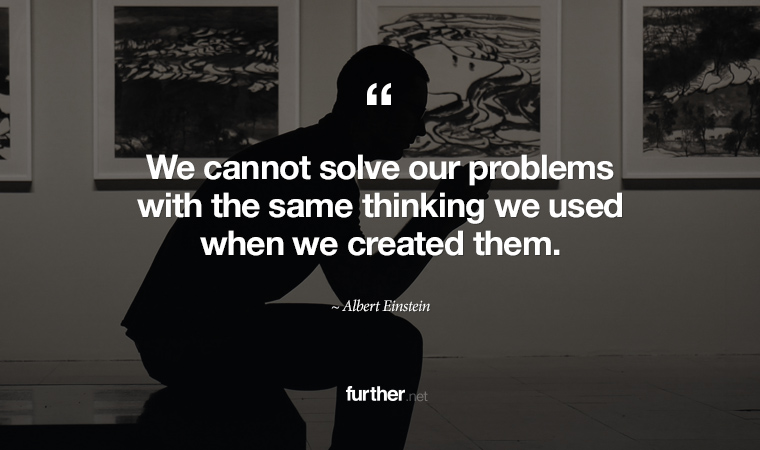
When you boil down my job as CEO and my tenure as an entrepreneur, it all comes down to making the right decisions. And to make those decisions, one needs to apply the correct thinking to specific issues, and stick with the problem long enough to get it right.
Of course, you can think about something for weeks and still get it wrong. That happens even when you get the right information, but apply the wrong cognitive filter.
In fact, we’ve got all the information in the world; that’s not the problem. It’s like drinking from a firehose, and the way you see the problem is what allows you to cut through the noise and access the answer.
In other words, mental models are the way to the answer. A mental model is an explanation of how something works that allows you to efficiently take a flow of relevant information and understand what it means in the context of solving a problem.
James Clear wrote about mental models this week, and he makes the case for their pragmatic application in all areas of life:
- The best mental models are the ideas with the most utility. They are broadly useful in daily life. Understanding these concepts will help you make wiser choices and take better actions. This is why developing a broad base of mental models is critical for anyone interested in thinking clearly, rationally, and effectively.
At the same time, James makes it (ahem) clear that adopting a single mental model, no matter how initially effective, ultimately leads to bad analysis and decisions:
- Here’s the problem: when a certain worldview dominates your thinking, you’ll try to explain every problem you face through that worldview. This pitfall is particularly easy to slip into when you’re smart or talented in a given area.
So, you need several different mental models in order to truly think better. Fortunately, Shane Parrish provides a plethora of models for “cross-training the mind” in another great piece.
113 mental models, to be exact. Dig in and think better.
- Mental Models: How to Train Your Brain to Think in New Ways
- Mental Models: The Best Way to Make Intelligent Decisions (113 Models Explained)
Keep going-
Brian Clark
Further
further: resources
Take It Easier
Studies show that high-intensity exercise offers myriad health benefits, but for a small subset of people, many of them beginners, a life-threatening condition known as rhabdomyolysis can crop up and quickly turn ugly.
As Workouts Intensify, a Harmful Side Effect Grows More Common
Protein Angst
With any nutrient that’s considered the “it” thing to have, there’s clearly lots of misinformation about it. In the case of protein, most adults are getting too much of it, and eating it all wrong. Here’s what you need to know about protein in your diet.
Health to the Yeah
One highlight of the documentary What the Health is the claim that eating one egg yolk equals smoking five cigarettes for people at risk for vascular disease. Sounds ridiculous, but it’s apparently research backed. I haven’t seen the film yet, but this article has me intrigued.
Critics of the Documentary “What the Health” Can Just Go to Health!
Vitality Reading
Reading doesn’t just improve your knowledge, it can help fight depression, make you more confident, empathetic, and a better decision maker.
How Changing Your Reading Habits Can Transform Your Health
South American Dream
South America has incredible adventures (such as conquering Machu Picchu), but planning can be overwhelming for the occasional traveler. Check out treks led by boutique and family-friendly companies that are breaking the tour group stereotype.
Top 10 Guided South American Adventures
Career Wealth
Success means different things to everyone. So why do we still think about it the same way?
Your Career Happiness Might Hinge On How You Define This Word
Power Leader
Researchers show how we tap into our brains to become a more effective leader and positive influence on others.
How to Gain Power, According to Science
With Prejudice
A new study complicates the narrative that only unintelligent people are prejudiced. The paper, published recently in the Journal of Experimental Psychology, suggests that smart people are actually more at risk of stereotyping others.
Smart People Are More Likely to Stereotype
Exit the Clown Car
Albert Camus died in 1960, and while life was certainly absurd during his lifetime (think two World Wars), I wonder what he’d think of the current climate. Still, his advice on dealing with the absurdity of life is spot on.
Albert Camus on the Three Antidotes to the Absurdity of Life
Mind Your Experience
Too often we spend our time thinking about our experiences, rather than just experiencing our sensory input. This can cause anxiety, fear, unhappiness, and frustration. Dropping into the mindfulness of pure experience is a way we can deal with those problems, in any moment.
The Mindfulness of Pure Experience
further: sharing
Please use the social sharing buttons below to share this issue of Further. Thank you!
